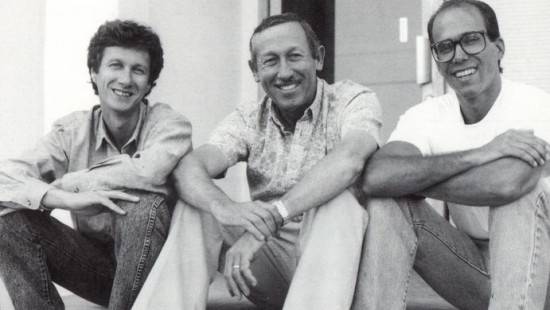
This afternoon I had the chance to see the documentary Waking Sleeping Beauty, the directorial debut of Oscar-nominated Disney producer Don Hahn (The Lion King, Beauty and the Beast). The film is an honest look at the behind the scenes going-ons of Disney Animation, from the years 1984 to 1994, a resurrection of sorts, producing a staggering output of big hits – Who Framed Roger Rabbit, The Little Mermaid, Beauty and the Beast, Aladdin, The Lion King and more.
The film tracks the interesting tale is the story behind the creation of those films, and the growing power struggle between Jeffrey Katzenberg, Michael Eisner and Roy Disney. We learn about how creativity somehow thrived in this environment of corporate chaos. The film is not your typical talking head doc, and is wisely presented almost entirely using archival footage cut from over 250 hours of footage, photos, and cut with narration from newly recorded audio interviews. A lot of the footage has never been seen before, in any film or making of doc, ever.
I've only heard third or fourth hand stories from this era, so I can't vouch for the accuracy. But it appears to be a very honest account, incorporating the point of view of most of the parties involved. I'm both surprised and glad that Disney trusted Hahn to tell this story. It's just another sign that the company understands the value of the true history of events, even if it doesn't always portray them in the best light.
Katzenberg probably comes off the worst, an executive who is plotting to replace Eisner as the public face of Disney. Sure, he was given the animation division in a time when no one else wanted it. When the ink and paint department was ousted from Disney Studios proper. But it is clear that many people involved believed that Katzenberg knew very little about the business of animation, or for that matter, the storytelling prcoess.
After an early test screening of The Little Mermaid, Katzenberg apparently tried to cut the "Part of this World" sequence as he didn't believe it would play to children. Thankfully, the musical number remained in the film due to the protest of almost everyone else involved. He supossedly convinced the best animators and talent to come aboard Pocahontas, rather than The Lion King, which he believed would be a failure.
The film gives the impression that Katzenberg wasn't as largely responsible for the success of the company's animation business during this period of time, not nearly as much as Katzenberg may want you to believe.
The crazy antics of the Disney animators keeps this from being a serious affair. At one point we see home video footage of the animators recreating scenes from Apocalypse Now in the Glendale offices. We see glimpses of footage of artists we know: Tim Burton drawing in a small office, John Lasseter recording a studio tour…etc. A lot of fun cameos for people who know about the current state of the animation business.
The film acts as a prequel of sorts. A prequel to the fall of an animation empire, 2D animated musicals, and another resurgence, with a computer animation company called Pixar. The Pixar Story could easily work as a third part of a trilogy, a more public relations version of the truth. The book The Pixar Touch appears to be a more honest and detailed version of that story. Although I don't expect that Hahn will film a sequel. And if it ever happens, it won't be another decade before the distance is created from the stories to provide a truthful and accurate account. Waking hints at the power struggle ahead, in which Roy Disney will oust Michael Eisner.
My biggest complaint is that the film doesn't contain an epilogue. If you're reading /Film, chances are you know the story that followed, but most of the mainstream public do not. My father could enjoy this film, but he probably has no idea that Katzenberg went on to run Dreamworks Animation. The film's lack of an epilogue leaves the story at a crossroads, without a resolution.
We instead get a conclusion, which appears to b the only clear Disney propoganda included in the movie — that no one will remember these behind the scenes wars, and that the stories and characters of the Disney animated films produced will be what is remembered in the history books. While this may be true, ending with this statement is like watching a movie where the main character wakes up in the end and realizes its all a dream. You can't tell this fantastic story and then conclude that the story doesn't matter, or mean anything. It's also an obvious statement. We've seen the films, we've bought the merchandise, and watched the parade


